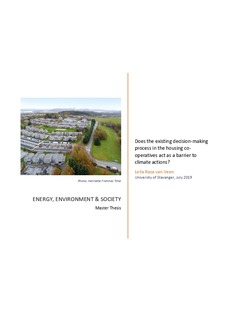| dc.contributor.advisor | Olsen, Karl Johan Engelhart | |
| dc.contributor.author | van Veen Raza, Leila | |
| dc.date.accessioned | 2020-02-26T14:02:01Z | |
| dc.date.available | 2020-02-26T14:02:01Z | |
| dc.date.issued | 2019 | |
| dc.identifier.uri | http://hdl.handle.net/11250/2644013 | |
| dc.description | Master's thesis in Energy, Environment & Society | nb_NO |
| dc.description.abstract | The extreme storms, rise of sea level, melting glaciers and famine are a few examples of “silent” catastrophes. We don’t feel their effects immediately, so we do not act upon them as if these matters are urgent. But they are. Luckily though, there are those that do try and implement measures in order to mitigate the impact of these major forces. The expanding renewable energy market is one tool that can be used in the fight against climate change.
A qualitative research is conducted in where it is investigated whether traditional decision – making processes in the housing co-operatives might have a negative impact on decisions regarding climate measures.
The rational decision process represents the ideal decision-making model and is used as theoretical framework during the research. The “bounded rationality”-theory considers the fact that we are often not able to see the full picture and are not able to rank our own criteria and goals might also fluctuate. Unable to select a universal “best” option, we will have to select the one that will best satisfy the criteria we have come up with among the options we have managed to uncover.
This research revealed the following barriers as the most relevant and challenging within a decision-making process: Lack of knowledge among board members and residents concerning climate measures, difficult to get behind all the information and data regarding the different measures, low turn-up on general assemblies, lack of incentives – economical support mechanisms, lack of guidelines and supporting legislations.
The following factors on the other hand were seen as factors that would have been facilitators for climate measures: Increased knowledge regarding climate measures, more specific solutions for the individual housing co-operations, simplified procedures and standard options, more resources such as counseling and facilitation from local municipality, more incentives and economical support for climate measures, laws and statutes that would set guidelines.
The problem in housing co-operatives seems to be that decisions are often made only for meeting the needs and interests of the residents. This means that the climate concerns are never on top of the agenda. The residents’ willingness to innovate mainly depends on the factor of cost/ benefit. Implementing climate measures is also not specified in law, there exists only a maintenance obligation which is embodied in the housing co-operative act §5-17.
The study also revealed that the average turn-up at the general assemblies is only 20%. This could be interpreted as a sign that not many residents in housing co-operatives have a desire to make an active choice regarding the distribution of the joint expenditures. In the concluding part this is used as an argument in favour of impersonalized default choice regarding environmental actions in the housing co-operatives. | nb_NO |
| dc.language.iso | eng | nb_NO |
| dc.publisher | University of Stavanger, Norway | nb_NO |
| dc.relation.ispartofseries | Masteroppgave/UIS-SV-IMS/2019; | |
| dc.subject | decision-making | nb_NO |
| dc.subject | rationality and bounded rationality | nb_NO |
| dc.subject | choice | nb_NO |
| dc.subject | policy | nb_NO |
| dc.subject | housing co-operatives | nb_NO |
| dc.subject | climate measures | nb_NO |
| dc.subject | solar energy production | nb_NO |
| dc.subject | miljø og samfunn | nb_NO |
| dc.subject | klimaendringer | nb_NO |
| dc.title | Does the existing decision-making process in the housing co-operatives act as a barrier to climate actions? | nb_NO |
| dc.type | Master thesis | nb_NO |
| dc.subject.nsi | VDP::Social science: 200 | nb_NO |
